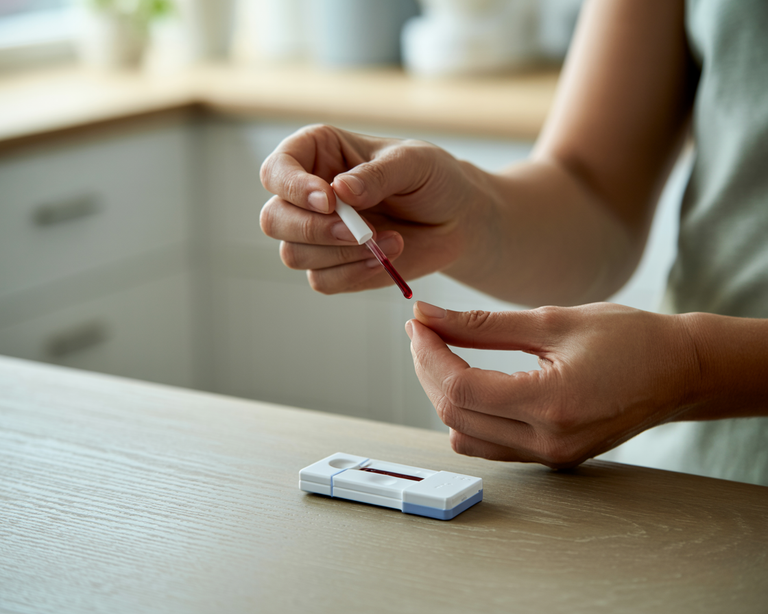What a high TSH result might mean and your next steps
- Date:
- 30/07/2025
- Author:
- Ellie Jones

TSH, or Thyroid-Stimulating Hormone, might not be something you think about every day, but it plays a big role in how your body feels and functions. This hormone plays a key role in governing your thyroid, which in turn influences so much about you, including your energy levels, how your body uses fuel, your mood, and more.
When your TSH levels are out of balance, it’s often a sign that something needs attention. A high result can mean your thyroid isn’t doing its job as efficiently as it should, and that can have ripple effects throughout your body.
In this blog, we’ll take a closer look at what TSH is and what you can do if your levels are high. From understanding the basics to exploring convenient ways to test at home, this guide helps you make sense of your thyroid health and take confident next steps.
What is TSH, and why does it matter?
TSH stands for Thyroid-Stimulating Hormone. Your pituitary gland, a small gland at the base of your brain, produces it. Think of the pituitary gland as the manager of your thyroid. Its job is to send signals to the thyroid gland, a small butterfly-shaped gland located in your neck.
The thyroid gland makes hormones, mainly T3 and T4, that control how your body turns food into energy through metabolism.
When your thyroid hormone levels are low, your pituitary gland produces more TSH to try and stimulate the thyroid to make more hormones. So, a high TSH result in a thyroid function test can sometimes indicate that your thyroid might not be producing enough hormones.
It's important to remember that a single test result is just one piece of the puzzle. Many factors can influence hormone levels.
Common symptoms of low thyroid function
If your thyroid isn’t producing enough hormones, it can affect many parts of your body in different ways. These changes often happen slowly and can be easy to overlook.
Some common signs that your thyroid might be underactive include:
- Ongoing tiredness or low energy
- Weight gain or difficulty losing weight
- Dry skin or brittle nails
- Feeling cold all the time
- Brain fog or trouble concentrating
- Mood changes, such as low mood or irritability
- Irregular periods or fertility issues
These symptoms can develop gradually and are sometimes easy to dismiss or attribute to other causes. But if they sound familiar, it may be worth checking your TSH levels.
At-home testing: a convenient first step

If you're experiencing symptoms that could point to an underactive thyroid, an at-home test can be a useful way to check your TSH level. Our Underactive Thyroid (TSH) Rapid Test Kit offers a convenient, private way to get a preliminary reading.
These tests are designed to be simple to use and give clear results within minutes. While they’re not meant to diagnose or confirm a condition, they can be a helpful first step in identifying whether your thyroid might need further attention.
These tests utilise the same calibre of technology trusted by healthcare professionals. They undergo strict certification processes, giving you confidence in the results you obtain.
It’s about empowering yourself with clear, accessible information.
Taking your results to a healthcare professional
If an at-home test shows a high TSH result, or if you have persistent symptoms that concern you regardless of a single test result, the most sensible next step is to discuss your findings with a healthcare professional.
Sharing your thyroid function test results with your doctor provides them with valuable information. They can take these results, consider your overall health history, discuss any symptoms you may be experiencing, and potentially recommend further evaluations if needed.
Beyond the test: supporting your overall well-being

Regardless of your thyroid function test results, focusing on overall well-being is always beneficial. While specific medical guidance may be necessary if an imbalance is identified by a healthcare professional, making healthy lifestyle choices can generally support your body's systems, including those that interact with thyroid function.
Here are some areas to consider:
Eat a healthy, balanced diet
Your thyroid gland, like all organs, benefits from essential nutrients to function effectively. Ensuring a balanced diet rich in vitamins and minerals is a cornerstone of general vitality.
Key nutrients often discussed in relation to thyroid function include iodine, selenium, and zinc. Aiming to get these through a varied diet that includes options like seafood, lean proteins, nuts, seeds, and whole grains is a helpful approach.
Monitor everyday stress levels
Chronic stress can have a wide-ranging impact on your body's various systems. Finding healthy ways to manage stress is crucial for overall wellness and can broadly support numerous bodily functions.
Simple practices like mindfulness, deep breathing exercises, gentle yoga, spending time in nature, or engaging in hobbies you enjoy can make a significant difference in fostering a sense of calm.
Exercise regularly
Physical activity is a powerful tool for supporting overall vitality, boosting mood, and helping to regulate energy levels. It doesn't have to be intense; finding activities you genuinely enjoy and can do consistently is key.
Whether it's brisk walking, swimming, cycling, dancing, or strength training, movement supports circulation and metabolic health, which can be widely beneficial for the body.
Listen to your body and choose activities that feel good and contribute to your energy, rather than causing exhaustion.
Focus on quality sleep
Sleep is a critical time for your body to rest, repair, and regulate many internal processes. A lack of quality sleep can generally influence hormonal balance and impact your energy and mood, sometimes presenting symptoms that might overlap with those associated with thyroid considerations.
Aim for consistent sleep patterns and create a calming bedtime routine to support restful sleep. Ensuring your bedroom environment is dark, quiet, and cool can also help enhance sleep quality.
Empowering your health journey
Taking a thyroid function test provides you with valuable insights about your body.
A high TSH result is not necessarily a cause for alarm, but rather an invitation to pay closer attention and gather more information. Using an at-home test kit can be a convenient way to confirm initial results or monitor your levels over time, especially given their accessibility and ease of use.
At Rezure, we believe that understanding your health should be straightforward and accessible. Taking steps to confirm results and discussing them with a healthcare professional allows you to approach your health proactively and make informed decisions.
Coupled with supportive lifestyle choices, you are well on your way to managing your well-being holistically and effectively.